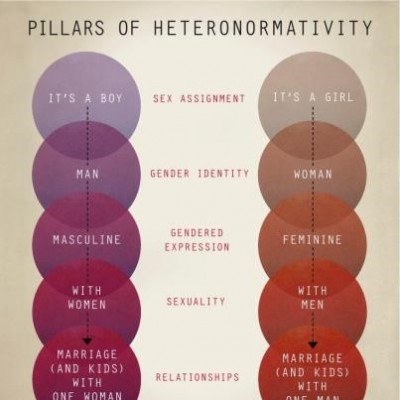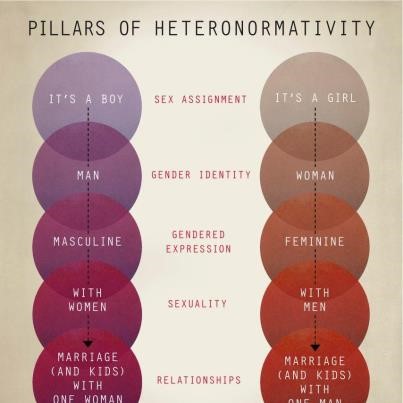
“The African newscaster asked the Jewish rabbi why there were no female rabbis, and the rabbi was very clever – he asked why there were no female chiefs!”
I am not sure if it was the self-congratulatory racism, rehash and ignorance of colonial dynamics, or the justification of sexism that irritated me more. There I was, sitting across from a Jewish writer in South Africa, and there he was, drinking his Ricoffy with a self-satisfied smirk on his face. I paused for a moment, and then responded:
“But in the reverse situation, if we had asked about chiefs, wouldn’t a chief have been able to ask about our rabbis?”
He looked shocked. “But that’s simply not how the world works-” he began.
Hold up. What is going on here?
One might be fooled to think, reading the constant rhetoric emanating from blogs, Facebook threads, slick yeshiva marketing, and self-congratulatory hasbara bloggers, that parts of the Jewish world have somehow solved patriarchy and heteronormativity. Despite the ample, readily available and accessible evidence to the contrary, it seems that a significant section of the Jewish world believes that all is well and hunky dory for women and queer folk in the people Israel today. (As a gay man, I must say: “lol, no”.) Somehow, it never happens in liberal, egalitarian, modern Jewish communities. It always happens somewhere else: Arabs, black people, black-hatters, Mizrahim, et cetera. (These arguments are usually also made by straight white/Ashkenazi men.)
There is a bad and racist habit of outsourcing blame for patriarchy, sexism, and homophobia in Jewish communities to other racial communities, other Jewish ethnic communities, or those who aren’t “Westernized” and “modern” in the Jewish world. As I will outline, it is pretty prevalent, and it needs to stop.
Let us return to where I started this piece, in my parents’ homeland of South Africa. Now, South African Jews, like most White South Africans (and yes, they are overwhelmingly white), are subject to the normative masculinity of White South Africa: perhaps best personified in rugby, and on public air to the world with the recent trial of Oscar Pistorius. Heteronormative, sexist language is common in South African Jewish communities – and, as one of the most nominally Orthodox communities in the world, much of the organization of Jewish life is highly gendered as well. Yet so often, critiques are dismissed under the mantle of tradition. However, many South African Jews then engage in the classic racist critiques of Africans as somehow irredeemably sexist. Mind you, much of that process comes from earlier impositions of European gender norms. In some cases it is told in ways as done above. In others, it is jokes depicting the black as sexist against the white norm. These policies are not just disgustingly racist, but also serve to push patriarchy as something other – and insulate the white man from critique.
Of course, these dynamics of outsourcing play out in the dogmatic “homeland” as well: look at how Israel is portrayed! Let us take LGBT rights as an example. Now, two things should be said. Firstly, Israel’s record on LGBT rights within the 1967 boundaries is not terrible – although certainly far from ideal. Secondly, problems do exist for LGBT Palestinians – that are well acknowledged by activists and often ignored perilously by white sympathizers. Furthermore, Israel’s LGBT rights record absolutely cannot be used to whitewash or “pinkwash,” as it is said, what Israeli Occupation unleashes upon Palestinians in the West Bank and Gaza.
However, pinkwashing does something else besides mask the Occupation: it masks domestic issues that we tend to forget too easily. Jewish-Israeli culture can be highly homophobic and is heavily reliant on romantic notions of masculinity. Israel has the lowest acceptance rate for homosexuals in the developed world, and the complete reliance on religious institutions for many aspects of civil life essentially render LGBT Israelis second-class citizens. Homophobic rhetoric remains startlingly common in the media and society in Israel, and protections against LGBT discrimination remain largely unenforced outside of liberal Tel Aviv. Furthermore, much of Israel’s “gay paradise” is largely limited to cisgender, Ashkenazi, secular men from the upper class. Israel is no gay rights paradise, and when we engage in the racist activity of assigning homophobia to “Arab culture,” we deny the very real homophobia LGBT people face in Israel today. Similar assignments of patriarchal and heteronormative tendencies to a “Mizrahi” or “Sephardi” mindset – done in a very public manner by Women of the Wall – fail in a similar regard. They reify racist categories and insulate certain folks from self-criticism.
These problematic dynamics are also found in the United States: not in Orthodoxy alone, but in egalitarian communities that often pride themselves on their progressivism. Of course, Orthodoxy does have issues with patriarchy as blatant as a mechitza in a room: it is difficult to deny, for example, how different tzniut is for men and women in lived practice. In addition, there are the questions of agunot who cannot secure divorces from their husbands, so many problems in mikvot, and…you get the idea. Orthodoxy has patriarchy issues – and even movements that try to address them, such as Open Orthodoxy, face fierce backlash. But it is not fair to identify patriarchy as an Orthodox issue alone.
Egalitarian Jewish communities are still riddled with patriarchy and heteronormativity, and no amount of racist or othering rhetoric can hide this fact. What is determined as normal, first off? So much of the “openness” about sex is really a reification of heterosexual activity: God as the female lover to the male worshipper, celebration of (certain forms) of sex as normal, and discussions of sex fundamentally centered on the heterosexual, married experience as ideal. Sure, the majority of people are straight, but do we queer folk merit an erasure? I also have noted a disturbing trend of transphobia in the Jewish community. Celebrations of manhood and womanhood are infused with the assumption of certain types of bodies – and intersected with questions about real manhood or womanhood. Many “accepting” communities simply refuse to discuss the question of gender identity at all! Finally, female rabbis and professionals are not always taken as seriously. Why are male rabbis’ talks more heavily attended? Why are so many Jewish organizational boards in the egalitarian world so male-centric? Too often – and I have seen it again and again on Facebook – practices are taken to have destroyed patriarchy already.
R’ Aryeh Bernstein at Jewschool made a stunning observation on his blog about how sexism plays out in the Ashkenazi, egalitarian establishment. Only a few of the heads of major Jewish organizations – egalitarian ones included – are women. I also think it is no accident that organizations run by straight men in the egalitarian Jewish world have a far less difficult time finding or accessing. (Though New Voices, sadly, is not one of them.)
But so often we are told that egalitarian Ashkenazi Jews don’t have patriarchy problems. Jewish schools tell us not to listen to rap – it is inappropriate and misogynistic, we are told – whilst papering over the problematic tendencies in much of Israeli pop music. A romance with Labor Zionism is rarely paired with a discussion of its adoption of problematic norms of “muscular masculinity.” How many rants on “the Muslim women” have I myself heard, followed shortly by a critique of a woman’s “inappropriate” dress or even my own “flamboyance” as a gay man?
As Atatürk said, “peace at home, peace in the world,” and that certainly includes smashing heteronormativity and the patriarchy. So let’s start at home, why don’t we? If we are to criticize gender dynamics in African chieftaincy, we must be as ready to critique – and indeed, more so – gender dynamics in synagogue boards from Cape Town to Chicago. If we are so ready to claim that homophobia is a matter of the Arab other, we must be ready to claim that it is as much a matter quite violently present across the Jewish spectrum today. If we are ready to cluck our tongues at the “backward Orthodox,” we must be ready to cluck our tongues at ourselves, since we are backward liberals. Before we place ourselves as members of egalitarian movements or progressive groups on a pedestal, we should confront the patriarchy and homophobia – and the racism they further reveal – on our own doorsteps.
It doesn’t matter what our intentions are, since patriarchy and heteronormativity are not magicked away. So instead of outsourcing the blame again, I challenge you to instead say:
“That is problematic, but where does it happen in my community?”
Prepare to be surprised at what you discover.
Jonathan P. Katz is an American student at Oxford University.

